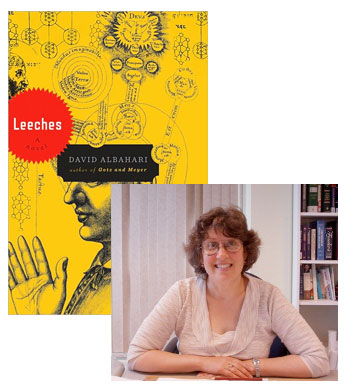Ellen Elias-Bursac & Albahari’s Amusing Leeches

Ellen Elias-Bursaċ has plenty of experience translating the Serbian author David Albahari—her English-language version of his novel Götz and Meyer won the ALTA Translation Award and was tapped for the Barnes & Noble Discover promotion, which is no mean feat for a translated novel, let me assure you. So when a former colleague sent me a copy of Albahari’s latest, Leeches, I thought it would be interesting to hear from Elias-Bursaċ about what attracts her to Albahari’s stories.
Leeches is a thriller, narrated from an undisclosed location outside of Serbia, reprising events that transpired in the spring of 1998 in wartime Belgrade and building to the months just before the NATO bombing campaign. The narrator’s position of exile links it to much of Albahari’s writing during the 1990s, when he was situating his protagonists in Canada (Bait, Snow Man, Globetrotter) and dealing with the war at a continental remove, but, in contrast, the story the narrator tells us in Leeches is situated directly in Belgrade, smack in the middle of the war.
The suspense generated by the thriller format works well to convey the atmosphere of suspended animation in the year before the NATO bombing. Suspended animation is, perhaps, the best way to describe the bated-breath atmosphere the novel creates. In fact the protagonist (never named) and his best friend, Marko, get stoned at frequent intervals throughout the novel. It’s not only their spacy highs and disjointed conversations, but the actual holding of breath in the process of getting high, that typifies for me the feel of the novel. This sense is further enhanced by the format of a single paragraph for the whole novel.
Spacy highs notwithstanding, the novel does not sidestep the reality it addresses. Unlike Götz and Meyer, which refracts questions of wartime responsibility through World War II, Leeches takes on the Miloševiċ regime and the culture it spawned front and center. His protagonist is a Serbian writer who finds himself embroiled in a mysterious, sometimes mystical, chase after an elusive beautiful woman, Margareta, and a mysterious, regenerating manuscript tied in various ways to the Jewish communities of Belgrade and Zemun (a city just across the Danube from Belgrade), and, perhaps, to the protagonist himself. Not so elusive are the neo-Nazi repercussions to his involvement with Jewish themes: attacks on his person, his apartment, the newspaper he works for, that ensue after he begins writing in his regular newspaper column about the plight of Serbian Jews.
The context of the tense, grim story line makes the fact of the humor of Albahari’s writing all the more striking. It’s the humor that motivates me, as a translator, to translate David Albahari’s writing. His protagonists are often rather solemn, first-person characters, usually urban intellectuals, seldom named. While never bumblers, Albahari’s protagonists are often bewildered by what happens to them and their innocence of the obvious brings a dark laughter to the bleakest of situations.
While the humor that propels Snow Man and Götz and Meyer borders on the manic, the humor in Leeches is wry. It didn’t make me cringe, or laugh out loud, but it often made me smile. Sometimes it surfaces in an odd, wry observation:
At that point we were standing by the door to the studio, Jaša Alkalaj lifted the corner of the doormat, we leaned over to see the key. Isak Levi started snoring again, leaning against the door frame, Jaša Alkalaj dropped the doormat and a little puff of dust rose, and we all hurried into the elevator, as if we were fleeing a sandstorm.
Sometimes the humor brings in a perspective that is ridiculous, even silly, in its innocence:
You’re getting back into form, said the editor, keep this up, and feathers will fly. I had no idea what he meant, and I hoped he was not expecting me to write about a chicken farm.
Sometimes it’s nothing more than a detail noted in passing that twists the narrative at the most difficult of moments, such as this one when thugs have just roughed him up in a nursery-school playground:
I watched them walk away. My knees were knocking, pain was rising in my gut, my eyes were tearing. I tried to take a step, but every step ached. I had to stop by a plastic penguin with a spring for feet, and a seat fastened to its head. I sat down and the penguin bounced.
The bouncing penguin—the jolt of humor that moves the story through the pain.
And finally, an aspect of Leeches which I appreciated as someone who has already translated several of Albahari’s novels and short stories: the novel incorporates an array of images and gestures from his earlier work such as the umbrella that appears in the last pages of Götz and Meyer, or the character standing in a hallway, ear pressed to an apartment door, listening to nothing.
29 April 2011 | in translation |

 Our Endless and Proper Work is my new book with Belt Publishing about starting (and sticking to) a productive writing practice.
Our Endless and Proper Work is my new book with Belt Publishing about starting (and sticking to) a productive writing practice. 
